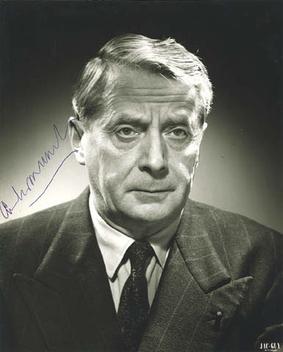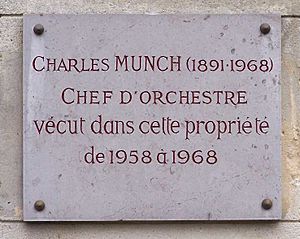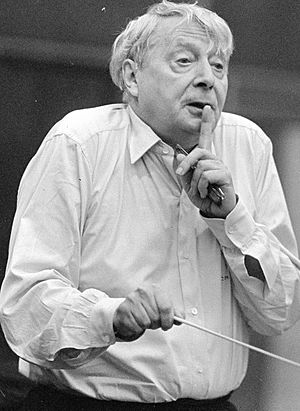Charles Munch (conductor) facts for kids
Charles Munch (born Charles Münch, September 26, 1891 – November 6, 1968) was a talented French conductor and violinist from Alsace. He was especially known for his amazing skill with French orchestral music. He is best remembered as the music director of the Boston Symphony Orchestra.
Contents
Charles Munch: A Famous Conductor
Early Life and Musical Journey
Charles Munch was born in 1891 in Strasbourg, a city in Alsace. His father, Ernst Münch, was an organist and choir director. Charles was one of six children. Even though he first dreamed of being a train engineer, he chose to study the violin at the Strasbourg Conservatoire. His father taught organ there and also led an orchestra where Charles played second violin.
After finishing his studies in 1912, Charles learned from famous violin teachers like Carl Flesch in Berlin and Lucien Capet in Paris. During World War I, he served in the German army as a sergeant gunner. He was injured in battles like Péronne and Verdun. Even though he spent most of his career in France and the United States, Munch always felt a strong connection to his Alsatian and German musical roots.
In 1920, Munch became a violin professor at the Strasbourg Conservatoire. He also worked as an assistant concertmaster (the lead violinist) for the Strasbourg Philharmonic Orchestra. Later, he was the concertmaster for other famous orchestras, including the Leipzig Gewandhaus Orchestra from 1926 to 1933.
A Conductor During Wartime
Charles Munch made his first appearance as a conductor in Paris on November 1, 1932, when he was 41 years old. His fiancée, Geneviève Maury, helped him by renting a hall and hiring an orchestra. He also studied conducting with Fritz Zweig.
After this successful start, Munch conducted many different orchestras in France. He became known for performing the music of Hector Berlioz. He also became friends with important composers like Arthur Honegger and Francis Poulenc. During these years, Munch helped introduce new musical works by many French composers. He even appeared in a French movie called Les Enfants du Paradis, which was filmed during the German occupation of Paris.
Munch stayed in France and continued to conduct the Conservatoire Orchestra during the German occupation in World War II. He believed it was important to help keep up the spirits of the French people. He refused to conduct in Germany or perform German music from that time. He also protected members of his orchestra from the Gestapo (the German secret police) and gave money to the French Resistance, a group fighting against the occupation. For his bravery, he received the Légion d'honneur, a very high French award, in 1945.
Leading the Boston Symphony Orchestra
Munch first conducted the Boston Symphony Orchestra on December 27, 1946. He then became their Music Director from 1949 to 1962. He also directed the Berkshire Music Festival and Berkshire Music Center (Tanglewood) during these years. Orchestra members liked his relaxed way of rehearsing.
Munch was excellent at performing modern French music, especially by composers like Claude Debussy and Maurice Ravel. He was also considered a top performer of Hector Berlioz's music. However, his concerts also included works by many other famous composers like Bach, Mozart, and Beethoven. During his time in Boston, he led 39 world premieres (first performances ever) and 58 American first performances of new music.
Touring the World with Music
Munch led the Boston Symphony on its first tour across the United States in 1953. He was also the first conductor to take them on tours overseas. They visited Europe in 1952 and 1956, and East Asia and Australia in 1960. During the 1956 tour, the Boston Symphony was the first American orchestra to perform in the Soviet Union.
The Boston Symphony, led by Munch, made many recordings for RCA Victor. These recordings helped share their music with people all over the world. Some of these recordings were among the first to be made in stereo sound. The orchestra also appeared on radio and television, bringing classical music to even more listeners.
Founding the Orchestre de Paris
In 1963, Munch returned to France. He became the president of the École Normale de Musique, a music school. He also continued to guest conduct orchestras in America, Europe, and Japan.
In 1967, the French Minister of Culture asked him to create a new, full-time orchestra. This became the Orchestre de Paris. Munch conducted its very first concert on November 14, 1967. The next year, while on tour in America with his new orchestra, he sadly passed away from a heart attack. He is buried in France.
Recordings
Charles Munch made many recordings throughout his career. He recorded with the Boston Symphony Orchestra for RCA Victor. He also made recordings in Paris and with other orchestras for various labels like Decca and EMI.
One of his first stereo recordings with the Boston Symphony, made in 1954, was of Hector Berlioz's The Damnation of Faust. Many of his recordings are still available today, including his performances of Saint-Saëns's Organ Symphony and Ravel's Daphnis and Chloe. Many of his recordings have been re-released in large collections, allowing new generations to enjoy his music.
Television
The Boston Symphony Orchestra appeared on television with Charles Munch, both locally in Boston and nationally. In 1960, a concert from their tour of Japan was broadcast across Japan. Munch also appeared on television with other orchestras, like the Chicago Symphony Orchestra and the Czech Philharmonic. Some of these performances are available on DVD.
|
See also
 In Spanish: Charles Munch para niños
In Spanish: Charles Munch para niños




